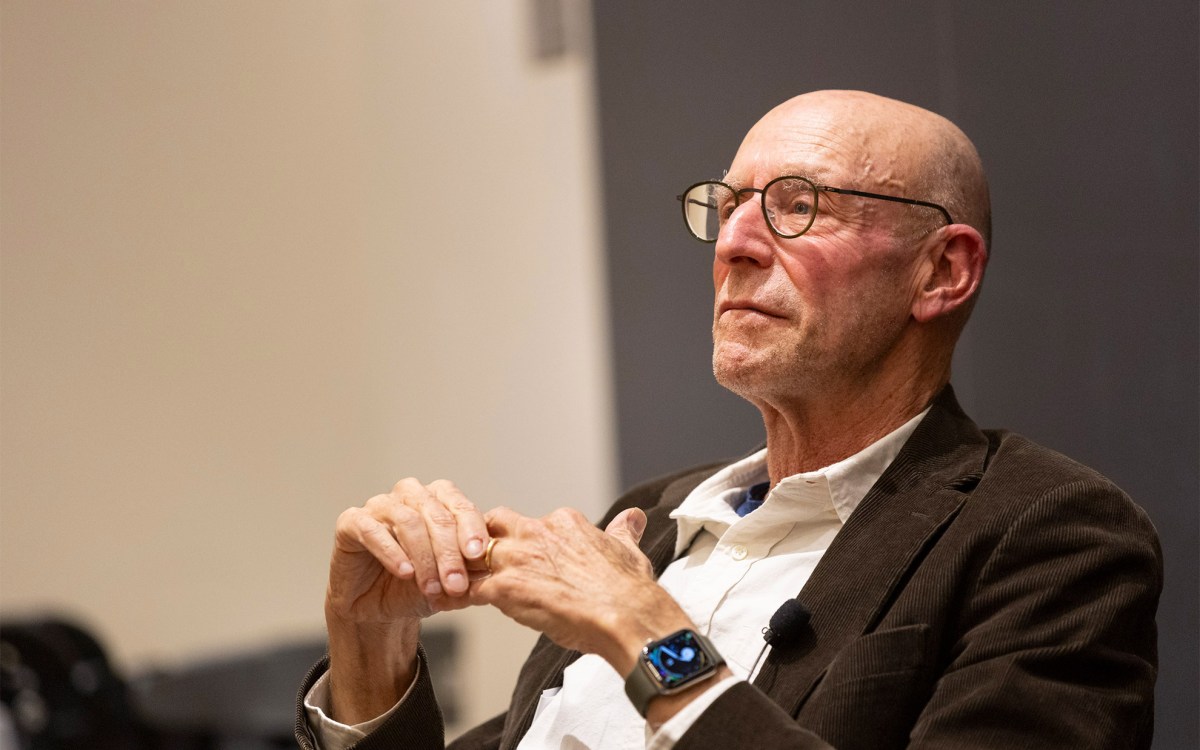Health
-

Yoga can help cut severe, initial opioid-withdrawal period in half, study finds
Researchers say results could dramatically increase chances of recovery
-

6 keys to a long, healthy life (ice cream included)
Also, why reading Ben Franklin beats climbing Mount Everest
-

Six cancers rising faster in younger adults than older ones
Large new global study fuels growing concern over trend of increases in several types

-

What’s next for GLP-1s?
Scientists eye new treatment targets for popular weight-loss drugs, from heart failure to addiction
-

Drinking 2-3 cups of coffee a day tied to lower dementia risk
Caffeinated tea also found to slow cognitive decline in study

-

New AI tool predicts brain age, dementia risk, cancer survival
Unlike other AI models, BrainIAC needs limited data to ID key neurological health indicators

-
Vitamin B and folic acid may reduce risk of age-related vision loss
Harvard Medical School (HMS) researchers at Brigham and Women’s Hospital have found that taking a combination of vitamins B6 and B12 and folic acid appears to decrease the risk of…
-
Low-income women with diabetes at increased risk for postpartum depression
Researchers at Harvard Medical School (HMS) and the University of Minnesota have found that living just above the poverty line and having diabetes increases by 50 percent a woman’s chance…
-
Patients are untapped resource for improving care, study finds
A 15-month study of 21,860 patients and 110 primary care physicians at 11 Harvard Vanguard health centers found that patients who received mailed reminders that they were due for colorectal…
-
Scientists identify antibodies effective against bird, seasonal flu viruses
Researchers at the Dana-Farber Cancer Institute, Burnham Institute for Medical Research, and the Centers for Disease Control and Prevention (CDC) have reported the identification of human monoclonal antibodies (mAb) that…
-
Attendance grows at Dental School’s ‘free care day’
Despite historic increases in health insurance coverage in Massachusetts, fewer than 20 percent of the commonwealth’s dentists accept patients insured through public programs such as Medicaid. Although state-subsidized insurance programs include dental care, the insurance mandate does not require employers to cover dental care. Dental schools are considered affordable sites for treatment, but even reduced fees are beyond the budgets of many families today.
-
Science programs advancing
Harvard President Drew Faust today renewed the University’s commitment to the vision of advancing interdisciplinary, collaborative science in general, and the Department of Stem Cell and Regenerative Biology (SCRB), the Harvard Stem Cell Institute (HSCI), and the Wyss Institute for Biologically Inspired Engineering (WIBIE) in particular.
-
The way of the digital dodo
The National Science Foundation-funded, three-year effort aims to create 3-D digital models of each species represented in Harvard’s collection of 12,000 bird skeletons.
-
Common gene variants increase risk of hypertension
A new study has identified the first common gene variants associated with an increased incidence of hypertension — a significant risk factor for heart attack, stroke, and kidney failure. The…
-
Clinicians override most medication safety alerts
Computer-based systems that allow clinicians to prescribe drugs electronically are designed to automatically warn of potential medication errors, but a new study reveals clinicians often override the alerts and rely instead on their own judgment.
-
Kou is shaking up the world of statistics
Harvard statistics professor Samuel Kou, now 34, grew up in Lanzhou, a city in China’s mountainous northwest near the border with Inner Mongolia. The altitude there is higher than Denver’s storied mile, and earthquakes rumble through town several times a year.
-
Exploring abundance under the sea floor
Called the North Pond Basin, the site — researchers at Harvard and beyond believe — can provide a window onto a vast world of subterranean microscopic life that extends kilometers below the Earth’s surface and which, according to rough estimates, could rival life above the surface in both diversity and sheer mass.
-
Neural wiring hints at nervous system gene limits
Genetics may play a surprisingly small role in determining the precise wiring of the mammalian nervous system, according to painstaking mapping of every neuron projecting to a small muscle mice use to move their ears. These first-ever mammalian “connectomes,” or complete neural circuit diagrams, reveal that neural wiring can vary widely even in paired tissues on the left and right sides of the same animal.
-
Doctors override most electronic medication safety alerts
Computer-based systems that allow clinicians to prescribe drugs electronically are designed to automatically warn of potential medication errors, but a new study reveals clinicians often override the alerts and rely…
-
Diverse ‘connectomes’ hint at genes’ limits in the nervous system
Genetics may play a surprisingly small role in determining the precise wiring of the mammalian nervous system, according to painstaking mapping of every neuron projecting to a small muscle mice use to move their ears.
-
International study identifies gene variants associated with early heart attack
The largest study ever completed of genetic factors associated with heart attacks has identified nine genetic regions — three not previously described — that appear to increase the risk for early-onset myocardial infarction. The report from the Myocardial Infarction Genetics Consortium, based on information from a total of 26,000 individuals in 10 countries, was given early online release today by Nature Genetics.
-
Art and science: Healing in harmony
What do Julie Andrews and Mozart have in common? And what links Hillary Clinton, Che Guevara, and Cameron Diaz? The former have absolute or perfect pitch; the latter are tone-deaf. How our brains differ to create these disparities was one of the subjects of “Crossing the Corpus Callosum,” a first-of-its-kind symposium held Jan. 10 at the Merck Research Laboratories-Boston.
-
Wilson receives NCSE’s Lifetime Achievement Award
Harvard professor Edward O. Wilson is the recipient of a Lifetime Achievement Award from the National Council for Science and the Environment (NCSE).

-
Two reasons to fete Darwin
Small is beautiful. Small may also be powerful. Judging from a copy on display at Harvard’s Houghton Library, the book that changed the world is only 8 inches high and 5 1/2 inches wide.
-
Gene therapy demonstrates benefit in patients with rheumatoid arthritis
Researchers have reported the first clinical evidence that gene therapy reduces symptoms in patients with rheumatoid arthritis (RA), an important milestone for this promising treatment . Described in the February issue of the journal Human Gene Therapy, the findings stem from a study of two patients with severe rheumatoid arthritis conducted in Germany and led by an investigator at Beth Israel Deaconess Medical Center (BIDMC).
-
Blavatnik Family Foundation gives Harvard $10M
The Blavatnik Family Foundation, headed by Len Blavatnik, M.B.A. ’89, has given Harvard University two gifts totaling $10 million in support of its scientific and technological research. Half the gift will go to the Eli and Edythe L. Broad Institute of Harvard and MIT to support cancer vaccine research, and half will go to the Harvard University Technology Development Accelerator Fund, which seeds highly promising early-stage research in the life sciences.
-
Neural mapping paints a haphazard picture of odor receptors
Despite the striking aromatic differences between coffee, peppermint, and pine, a new mapping of the nose’s neural circuitry suggests a haphazard patchwork where the receptors for such disparate scents are as likely as not to be neighbors.
-
$100 million gift to launch innovative search for AIDS vaccine
Medical School Professor Bruce Walker has been selected as the founding director of a unique new $100 million effort to finally develop a vaccine that can halt the global HIV/AIDS pandemic that, if it continues unchecked, is predicted to claim an additional 70 million lives by 2020.
-
The Improvising Brain
What’s involved when a musician sits down at the piano and plays flurries of notes in a free fall, without a score, without knowing much about what will happen moment…
-
Hundred million dollar gift to launch innovative search for AIDS vaccine
Harvard Medical School professor Bruce Walker, M.D. has been selected as the founding director of a unique new $100 million effort to finally develop a vaccine that can halt the…
-
Scientists uncover new class of mammalian genes with key functions
A research team at the Broad Institute of Harvard and MIT and Beth Israel Deaconess Medical Center has uncovered a vast new class of previously unrecognized mammalian genes that do…
-
Stem Cell Research: The Quest Resumes
“After eight years of political ostracism, stem-cell scientists like Harvard’s Douglas Melton are coming back into the light — and making discoveries that may soon bring lifesaving breakthroughs. Scientific inspiration…
-
Topical treatment wipes out herpes with RNAi
Harvard Medical School researchers have succeeded in developing a topical treatment that, in mice, wipes out herpes virus, one of the most intractable sexually transmitted human diseases. Judy Lieberman, professor…
-
Surgical safety checklist drops deaths and complications by more than one-third
A group of hospitals in eight cities around the globe has successfully demonstrated that the use of a simple surgical checklist during major operations can lower the incidence of deaths…
-
Spinal tap unnecessary for most babies with uncomplicated febrile seizures
When babies develop a fever high or abrupt enough to cause a seizure, frightened parents often rush them to the emergency room, where their workup frequently includes a lumbar puncture…
-
Obesity: Reviving the promise of leptin
The discovery more than a decade ago of leptin, an appetite-suppressing hormone secreted by fat tissue, generated headlines and great hopes for an effective treatment for obesity. But hopes dimmed…


